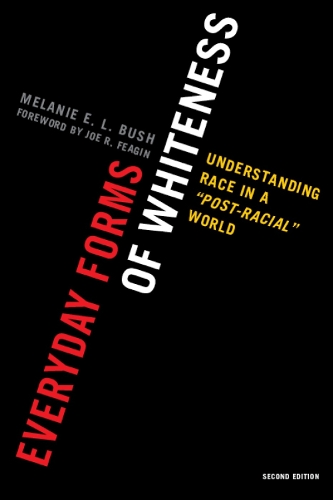
Everyday Forms of Whiteness: Understanding Race in a 'Post-Racial' World
(Paperback, Second Edition)
Publishing Details
Everyday Forms of Whiteness: Understanding Race in a 'Post-Racial' World
By (Author) Melanie E. L. Bush
Foreword by Joe R. Feagin
Bloomsbury Publishing PLC
Rowman & Littlefield Publishers
16th January 2011
Second Edition
United States
Classifications
Tertiary Education
Non Fiction
Ethnic studies / Ethnicity
Ethnic groups and multicultural studies
305.8
Physical Properties
Paperback
330
Width 155mm, Height 231mm, Spine 20mm
519g
Description
The second edition of Melanie Bush's acclaimed Everyday Forms of Whiteness looks at the often-unseen ways racism impacts our lives. The author has interviewed and surveyed hundreds of college students and reveals that even though we talk as though we live in a "post-racial" world after the election of Barack Obama, racism is still very much a factor in everyday life. The second edition incorporates new data and interviews to show how the everyday thinking of ordinary people contributes to the perpetuation of systemic racialized inequality. The book introduces key terms for the study for race and ethnicity, reveals the mechanisms that support the racial hierarchy in U.S. society, then outlines ways we can challenge long-standing patterns of racial inequality.
Reviews
This new edition of Bush's influential study is a deeply researched guide to the contours, continuities, and 'cracks' of modern U.S. racism. It brilliantly shows how the exemption from racial oppression that whiteness grants to some Americans, locks them into other miseries. -- David Roediger, University of Illinois; author of How Race Survived U.S. History
In the rapidly growing field of studies interrogating the construction of whiteness, relatively few are grounded in ethnographic methods examining the everyday experiences of people in real time. Melanie Bush's Breaking the Code of Good Intentions brilliantly explores the everyday dimensions of how white Americans maintain and reproduce the inequalities of race through common interaction. Well-written and effectively argued, this study provides critical new insights and makes an important contribution to the social science literature about race. -- Leith Mullings, former president, American Anthropological Association, 2011-2013; Distinguished Professor, Graduate Center at City University of New York
Highly recommended text for any student, scholar, or community activist with an interest in the salient issues of race, whiteness, and social justice. * Journal Of Educational Thought(Jet) *
Praise for the first edition:
The field of whiteness studies is a complex domain laden with mines and misunderstandings. Melanie Bush has successfully traversed that field, bringing staightforward clarity and profound insight to the domain. Breaking the Code of Good Intentions provides rigorous empirical data, thick contextualization, and compelling interpretation to those who are interested in whiteness as a powerful cultural force. This book is necessary reading not only for those invested in whiteness studies but also for those attempting to understand the mutating nature of racism in the twenty-first century. Bush constructs a piece de resistance in the attempt to make sense of contemporary American culture.
This highly compelling and thought-provoking book achieves this impossible task, and contributes significantly to the scholarship not only on sociology, critical race studies and related fields, but also on Critical Whiteness Studies, which engages a variety of disciplines across academia. The book engages an ongoing dialogue with the current issues of race and racialization in contemporary American society, extending the discussion of larger implications of everyday "doing race" to the global scene. Academically rigorous and theoretically sophisticated Everyday Forms of Whiteness invites the reader to commend Professor Melanie E. L. Bush for her superb explanation of the everyday thinking and practices of ordinary white people, while bearing the hope for a social and political transformative change both in the United States and across the globe. * Critical Sociology *
Author Bio
Melanie E. L. Bush is associate professor of sociology and anthropology at Adelphi University. She has published numerous articles in scholarly journals and presented at a range of national conferences particularly in the fields of sociology and anthropology, and in 2003 she was a prize winner of the Praxis Award, given by the Washington Association of Professional Anthropologists for outstanding achievement in translating knowledge into action in addressing contemporary social problems.
